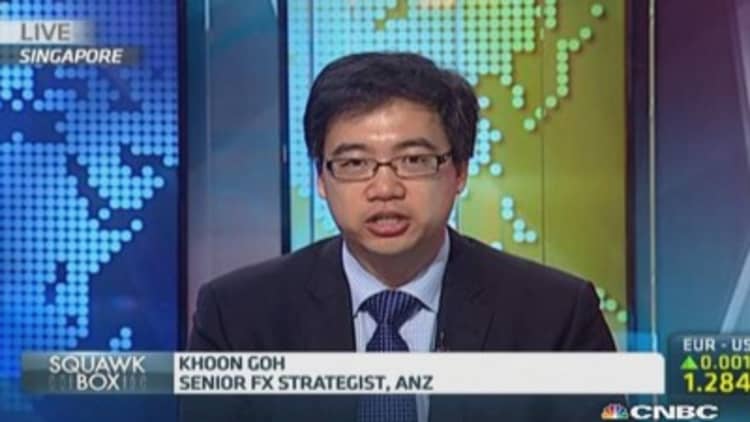The U.S. dollar may push higher this week if an influential policymaker from the U.S. Federal Reserve drops his dovish tone and suggests the world's largest economy is ready for an interest hike earlier than the mid-2015 consensus, currency strategists told CNBC.
New York Federal Reserve President William Dudley - also vice-chairman of the central bank's rate-setting panel, a permanent voting member and widely regarded as a policy dove - is scheduled to speak tonight in New York.
Dudley's remarks this week - the highlight for currency markets - will be followed by speeches from fellow policymakers including Jerome H. Powell, Narayana Kocherlakota and Loretta J. Mester - all voting members of the Federal Open Market Committee (FOMC) in 2014.
"I want to hear Dudley," said Robert Rennie, Westpac's global head of FX strategy in Sydney. "That will be big."
Read MoreWhat the Fed's dream trade looks like
Dudley said in late June that the Fed can reasonably wait to raise interest rates until mid-2015 without risking an undesirable rise in inflation. Any indication by Dudley that he favors an earlier rate hike may send the dollar higher, said Khoon Goh, senior FX strategist at ANZ. The Australian bank expects the first Fed rate hike to occur in March.
"Any pronunciation from him on the dovish side shouldn't come as a surprise," Goh told CNBC Monday. "The big risk is if he does come out less dovish than what the market is expecting, then we could see a further boost to the USD (U.S. dollar)."
Fed policymakers last week indicated they expect faster rate hikes next year and the year after. The central bank pushed up its expected path of interest rate increases – the so-called Fed 'dots' forecast - boosting yields on U.S. treasuries, and the dollar.

As a policy dove, Dudley may "downplay the dots from last week's FOMC," ANZ's Goh said. Still, given Fed Chair Janet Yellen's insistence that the rate outlook is data-dependent, upside surprises in this week's economic indicators - which include existing home sales, durable goods orders and consumer sentiment – may shift the balance in favor of the dollar bulls. "The reality is that the Fed is on data-watch mode," Goh said.
Almost three-quarters of CNBC poll respondents (16 out of 22) believe the U.S. dollar will move higher this week. A little under a fifth - 18 percent (four out of 22) – expect the greenback to decline while 9 percent (two out of 22) said the dollar will trade at around current levels.
Read MoreThis could be the trade of the decade
Latest data from IG Markets show client sentiment almost evenly split with 51 percent of their more than 501 clients with open positions betting on a firmer U.S. dollar against the yen while 49 percent expect the cross to fall.
Dollar gains may be relatively muted in the near-term though the consensus view suggests the currency's longer term bull market is intact. "Dollar has additional upside but the easy gains are over," said Ed Ponsi of Barchetta Capital.
The dollar is likely to "consolidate" this week, said Emma Lawson, Senior Currency Strategist at National Australia Bank, although trade may choppy given the risk of "lots Fed speakers likely contradicting each other."


